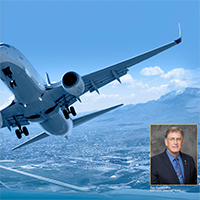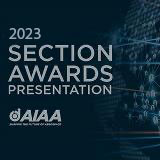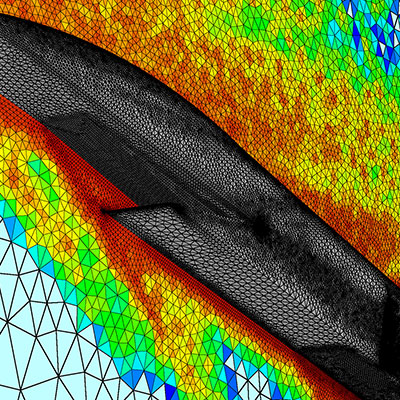Aeronautics
The aeronautics community is continuing to chase the horizon. Innovators are pushing technology to deliver new products and services for the benefit of society. In the next 5–10 years, many new capabilities will be introduced, and the next generation will experience flight in ways we are just imagining. We stand at the precipice of urban flight, integrating ground and air vehicles in new ways. The industry is building on the advances made since the early 20th century taking us further, faster, safer, and cleaner. AIAA advances these opportunities through its focus on the Aeronautics Domain.
 Aeronautics in the 21st Century: Safe, Sustainable, and Smart
Aeronautics in the 21st Century: Safe, Sustainable, and Smart
By AIAA Executive Director Dan Dumbacher
The aeronautics industry is embracing opportunities in the near term that will contribute to its enduring legacy of changing society and reshaping everyday life as we know it.
Priority Areas in Aeronautics
Advanced Air Mobility Advanced air mobility could grow into a $115 billion industry that gives all of us new transportation options. With clear operational guidelines, regulations, and standards for accommodating and incorporating autonomy, we see a thriving integrated urban and regional airspace in the next decade. The benefits of autonomy will enhance safety for everyone and enable capabilities we are only just imagining.
Carbon Emissions and Sustainability The global community is focused on achieving net-zero greenhouse gas emissions from the aviation sector by 2050. The AIAA community plays an integral role in this effort that will make a substantial difference to benefit our planet.
AIAA is working with the industry toward several steps, including:
- Advocacy for more government support for the goal of carbon-free aviation by 2050
- Deployment of SAF for current airline fleets, while also addressing fleet recapitalization
- Adoption of hydrogen fuel cells and other clean, renewable energy sources
- Focus on new R&D
- Development of the “green” aviation workforce
Certification The widespread use of UAVs and drones—both commercial and recreational—prompted the Federal Aviation Administration (FAA) to adapt its certification processes. Similarly, the FAA must facilitate safe use of AAM systems for passenger and cargo transport. As the FAA refreshes its certification strategy, we expect to see clear specifications, regulations, and standards emerge that will strike an appropriate balance between safety and innovation.
Space launches are close to a daily occurrence and launch sites are infringing on urban environments and large metropolitan areas. The integration of commercial air traffic, AAM, and space launch traffic must receive government attention to help drive global regulatory and certification strategies that ensure safety and continued smooth sustainable economic growth for all stakeholders.
Hypersonics and Supersonics High speed “transportation” – both military and civilian – is fast becoming a reality. Integrating hypersonic and supersonic flight into the national and global airspace will require attention to operational efficiency, safety through certification, and environmental and societal impacts including noise and emissions. AIAA will address questions around:
- Is sustainable civil high-speed endo-atmospheric flight achievable?
- What role does the government have in promoting hypersonic and/or supersonic flight?
- What technologies are needed to develop and mature efficient and low environmental impact hypersonic and supersonic flight?
Courses
News
-
 AIAA Announces Winners of Prestigious Zarem Graduate Student Awards for Distinguished Achievement in Aeronautics and Astronautics
AIAA Announces Winners of Prestigious Zarem Graduate Student Awards for Distinguished Achievement in Aeronautics and Astronautics
5 September 2023
AIAA is pleased to announce the winners of the Zarem Graduate Student Award for Distinguished Achievement. The winners will receive their awards at the 2024 AIAA SciTech Forum, Orlando, Florida, 8–12 January 2024. -
 AIAA Announces Next Editor-in-Chief of the Progress in Astronautics and Aeronautics Book Series
AIAA Announces Next Editor-in-Chief of the Progress in Astronautics and Aeronautics Book Series
24 August 2023
AIAA is pleased to announce that Seetha Raghavan, professor of Aerospace Engineering and associate dean of Research and Graduate Studies at the College of Engineering at Embry-Riddle Aeronautical University, Daytona Beach, will serve as the next editor-in-chief... -
 AIAA Announces 2022-2023 Section Award Winners
AIAA Announces 2022-2023 Section Award Winners
23 August 2023
AIAA has announced its 2022–2023 section award winners. The section awards honor particularly notable achievements made by members of AIAA’s 57 sections around the world in a range of activities...
Past Events
-
 AIAA Webinar: A Brief History of Modern Hypersonics, Or How Did We Get Here?
AIAA Webinar: A Brief History of Modern Hypersonics, Or How Did We Get Here?
17 June 2021 1200 - 1300 (Eastern Daylight Time)
Online
-
 AIAA Webinar: Sustainability in Flight – The Government’s Role in Achieving Decarbonization
AIAA Webinar: Sustainability in Flight – The Government’s Role in Achieving Decarbonization
26 April 2021 1100 - 1200 (Eastern Daylight Time)
Online
Leaders in aviation will share perspectives on the industry’s commitment to reducing their carbon footprint. The expert panel will discuss efforts underway and the significant cooperation, innovation, and education required among all industry stakeholders to deliver on this important goal. -
 2021 Integrated Communications Navigation and Surveillance Conference (ICNS)
2021 Integrated Communications Navigation and Surveillance Conference (ICNS)
20 April - 22 April 2021
Virtual Event
The Integrated Communications Navigation and Surveillance (ICNS) Conference is the premier international aviation conference addressing technology and policy advances in CNS research, development and implementation programs, and policies related to CNS/ATM capabilities and applications.
Aeronautics Playlist
Task Forces
The AIAA Advanced Air Mobility Task Force is guiding the implementation of the AIAA plan for advanced air mobility (AAM) systems capabilities. AAM could embody the single greatest transformation for aviation business, science, and policy—and
public perceptions—since the emergence of mainstream commercial aviation in the mid-20th century. With clear operational guidelines, regulations, and standards for accommodating and incorporating autonomy, AIAA sees a thriving integrated urban
and regional airspace in the next decade. The benefits of autonomy will enhance safety for everyone and enable capabilities we are only just imagining.
Watch the 10 May 2023 AIAA AAM Task Force meeting with the Association for Uncrewed Vehicle Systems International (AUVSI), hosted by the Vertical Flight Society. Watch Video
AAM Task Force Public Forum
The AIAA Carbon Emission and Sustainability Task Force is addressing efforts across AIAA to drive progress toward net zero carbon emissions by 2050. In 2019, commercial aviation produced ~2% of global human-induced carbon dioxide emissions.
Many aviation industry stakeholders and AIAA members are taking on generational-scale challenges that require broad collaboration and support. AIAA sees the need and opportunity for the aviation industry to pursue technology development, product and
services development, and operational changes to reduce the impact to climate change.
Carbon Emissions & Sustainability Task Force Public Forum
AIAA Aeronautics Lead
-
 Mike Borfitz
Certification Task Force Co-Chair, CEO, Kilroy Aviation
Mike Borfitz
Certification Task Force Co-Chair, CEO, Kilroy Aviation

